Your support helps us to tell the story
From reproductive rights to climate change to Big Tech, The Independent is on the ground when the story is developing. Whether it's investigating the financials of Elon Musk's pro-Trump PAC or producing our latest documentary, 'The A Word', which shines a light on the American women fighting for reproductive rights, we know how important it is to parse out the facts from the messaging.
At such a critical moment in US history, we need reporters on the ground. Your donation allows us to keep sending journalists to speak to both sides of the story.
The Independent is trusted by Americans across the entire political spectrum. And unlike many other quality news outlets, we choose not to lock Americans out of our reporting and analysis with paywalls. We believe quality journalism should be available to everyone, paid for by those who can afford it.
Your support makes all the difference.The Government has rejected proposals to make sure tickets for popular sports matches and music events are not resold for a huge profit.
Ministers said the price of re-sold event tickets should be decided by “supply and demand” – jargon meaning whatever fans can be convinced to pay.
“The Government believes that prices should be set by supply and demand in the secondary ticketing market,” said culture minister Tracey Crouch in response to a question from a Labour MP.
Chris Bryant had written to ministers to ask them what steps they were taking ensure that tickets for the Rugby World Cup and Ashes cricket tests were sold at their face value.
The free-market rhetoric of ‘supply and demand’ contrasts with government positioning before the election which saw headlines proclaiming a crackdown on touts.
Sports minister Lord Moynihan, the former chairman of the British Olympic Association, said at the time: “This harvesting is now out of control and volumes of tickets are acquired on such a scale it is proving hard if not impossible for genuine music and sports fans to purchase a ticket at face value for high-demand events.”
In the event, the Consumer Right Act 2015, which came into force last month after an intervention from the peer, only requires touts to state the original price of the ticket and other relevant information about the event.
It does not mandate original resale value and focuses on ‘transparency’ rather than rules about what can be charged.
With the supply of sports tickets fixed by the capacity of a game's venue and potentially infinite demand to see top teams, resold tickets for some events can reach hundreds or even thousands of pounds.
“The measures set out in the Consumer Right Act 2015, which came into force on 27 May, will enable consumers to make an informed decision on the tickets they purchase,” Ms Crouch said in response.
But higher prices are likely to mean that fans on lower incomes are less able to afford events, meaning the decisions of whether to attend will have already been taken for them.
A spokesperson for the Department of Culture Media and Sport did not immediately respond to further requests for comment.
The Government has committed itself to a further inquiry into the secondary ticketing market which is expected to report later this year.

Join our commenting forum
Join thought-provoking conversations, follow other Independent readers and see their replies
Comments